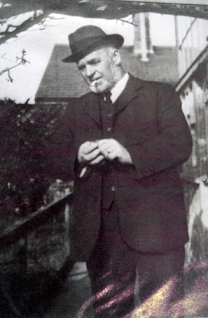Heroes and Rebels in the Family Tree – William Thomas Tripp, MBE
Born on the 25th of October 1861 in
Kessingland to Ritson Tripp and Patience Catchpole he was to lose both his
parents by the time he was 7 years old.
Before his first birthday his father
Ritson had died while trying to save his drowning brother Robert. At the time
of his death Ritson was survived by Patience, William and daughter Ellen
Catchpole Tripp who was a year older than her brother.
Then on the 19th of July 1869 when
William was 7 years old his mother Patience sadly passed away, leaving the 2
children orphaned.
On the census of 1871 William was
living at 'the heath' Kessingland with his Grandfather John Catchpole a fishing
boat owner and a member of one of the most prominent families to reside in
Kessingland at the time and the most likely reason for William's rise in
fortune.
Interestingly William was listed on
the census as being the son of a Hannah Blake who was a widow and daughter of
John Catchpole, presumably this was done to protect him.
His sister Ellen married James Rogers
Moore at St. Margaret’s Church in Lowestoft on the 13th of January 1880 but she
also passed away young a year later in 1881 aged just 21.
Her widowed husband James was to later
marry Elizabeth Sarah Jullings.
The Tripp/Catchpole connection carried
on when William aged 18 married Maria Catchpole the 19-year old daugther of a
Henry Catchpole a fishing boat owner who was also the landlord of the Sailors
Home in Kessingland. Henry and his 2
wives had an incredible 19 children between the years 1828 to 1869. So it’s
fair to say that Henry made quite a contribution to the Catchpole Kessingland
dynasty.
William and Maria set up home on the main road through Kessingland, the Turnpike Road.
By the census of 1891 they had moved into the beach part of the village in Green Lane and one of their neighbours was the family of George Catchpole. The 2 men were to became business partners, fishing boat owners and leading men of the parish. The families later set up homes next door to each other in Church Road, William lived in Dambrook House and George in Eddystone House on the land adjacent to the now Catchpole Close that is named after George and family.
The two men were pioneers as the fishing
industry moved from sail to steam and they made the most of the thriving
herring fishing of that era.
William was chairman of the parish
council, and also donated a cup for local footballers called the Dambrook Cup.
He fought the government in London
during WW1 forcing them to allow the fishermen of Lowestoft to carry on their
trade during the war and the fishermen of Lowestoft joined together and
presented him with a solid silver tea and coffee service.
He was also awarded an MBE for his
services to the admiralty as he designed a method of catching German U-Boats in
fishing nets.
The fishing boat Lord Leitrim was
later registered in Milford Haven and named Tripp in his honour.
When he died 27th November 1928 his
probate of over £40,000 was to his widow Maria, son Ritson and a salesman
called Frederick Chapman.
William and Maria had 10 children of whom 9 survived beyond infancy..
1 The first child was Lily Ellen b1881 who married Arthur Henry Strowger in 1905 and their son Gaston Jack Strowger received a CBE in 1976 for services to industry. Later in 2007 Gaston commissioned a new window for Kessingland church in memory of his wife Katherine and to honour the Driftermen of the village. The name of Strowgers Way in Kessingland comes from this family.
2 Ritson John b1883 and married
Kathleen Maria Sims in 1904 and was a fishing boat owner.
3 Frederick William was b1884 and
d1900.
4 George Henry b1885 and married
Harriet Ellen Hart in 1910.
5 Sydney James b1887 and married
Elizabeth Sarah Moore in 1907, also a fishing boat owner.
6 Dennis Thomas b1889 and married
Irene Letitia Utting in 1920 and died 9 February 1929 in The British Hospital,
Benuos Aries, Argentina.
7 Kathleen Muad b1890 and married
Edward Parsons Churchill in 1929.
8 Winifred May b1883 and married
Reginald Bell in 1918.
9 Clifford Edward Tripp b 1893 and d 1894 at 12 months.
10 Victor Claude b1895 and died 12th October 1916 in The Battle of Transloy, at Bapaume, Pas-de-Calais, Nord-Pas-de-Calais, France beside his childhood friend and next-door neighbour Charles Catchpole.
GENEALOLGY: William Thomas Tripp (1861-1928) is related to the family tree through his father Ritson Tripp (1835-1862) whose mother was Elizabeth Whincop (1808-1893) and whose mother was Elizabeth Baldry (1781-1858) whose father was Philip Baldry (1748- ) and his father was Farrer Baldry (1709-1774) and his father was Henry (Boldero) Baldry (1670-1743). Henry (Boldero) Baldry had a son John Baldry (1705-1774) and his son was John Baldry (1755-1833) and his daughter was Susanna Baldry (1774-1858) and her daughter was Phoebe Mayes (1804-1873) and her son was Thomas Forster (1837-1888) and his daughter was Caroline Forster (1864-1906). Caroline Forster was the wife of George William Welsh-Adams.




Comments
Post a Comment